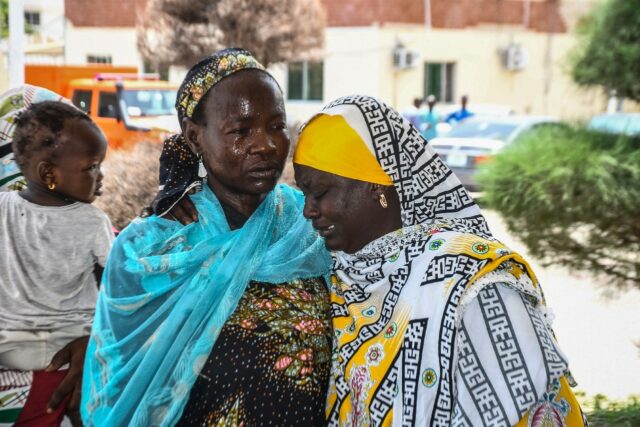Sitting at a hospital bedside in northeast Nigeria, Aishatu Usman watches over her son, still unconscious after her family were caught in a rare suicide attack on a weekend wedding.
At least 18 people were killed in Saturday’s attack by three female suicide bombers in Gwoza, Borno State, the heart of a conflict in northeast Nigeria that has killed 40,000 people and displaced 2 million since 2009.
The conflict has ebbed since armed forces pushed jihadists back from territory they held at the height of the fighting. But militants still carry out sporadic attacks and ambushes in remote areas. Saturday was a rare urban assault.
“What can I say? My son is unconscious,” she said, talking of the victims. “I pray that God grant them speedy recovery and to the perpetrators of this heinous act, may God guide them to the right path.”
Gwoza was the scene of four almost simultaneous suicide attacks on Saturday, including at least three perpetrated by female bombers, leaving at least 18 dead, according to local emergency services. Dozens more were injured.
No group has claimed the attacks, but they were a painful reminder of the threat posed by the Boko Haram jihadist group and its rival Islamic State West Africa Province in the region.
Suicide attacks have always been part of their armed struggle to establish a caliphate in the northeast of Africa’s most populous country.
Militants still carry out ambushes, roadside bombings and kidnappings from their rural hideouts, but suicide bombings, especially with multiple attackers, have become rarer.
Boko Haram seized Gwoza in 2014 after taking over parts of Borno State.
The town was retaken by the Nigerian army with the help of Chadian forces in 2015, but jihadists still launch attacks from the mountains overlooking the town on the border with Cameroon.
Nigerian President Bola Ahmed Tinubu “strongly condemned the bomb attacks” in a statement on Sunday, saying the assault was “a clear manifestation of pressure mounted against terrorists and the success in degrading their capacity.”
“These cowardly attacks are only but an isolated episode,” Tinubu said.
Jihadists in the northeast are one of several security threats facing Nigeria’s armed forces, including heavily armed criminal gangs who carry out mass kidnappings for ransom in the northwest and separatist movements in the southeast.
When he came to power a year ago, Tinubu made the fight against insecurity a priority of his mandate.
Back to 2014
Saturday’s first attack took place during a wedding ceremony, around 3 pm, when a suicide bomber set off explosives among the guests, officials said.
As funeral prayers for the victims of the wedding attack were ongoing, another female suicide bomber detonated her device, according to Barkindo Saidu, head of the local emergency services (SEMA), in a report seen by AFP.
A few minutes later, an explosion of another device by a teenage girl detonated around the city’s general hospital, the report said.
A member of the anti-jihadist militia who work with the army in the city, told AFP that a fourth suicide attack had targeted a security post, killing three people including a soldier.
That has not yet been confirmed by officials.
“This has taken me back to memory lane of 2014 when Gwoza was raided by these terrorists group,” Baba Shehu Saidu, a relative of some of the victims said.
SEMA’s Saidu gave a provisional toll of 18 dead and around forty injured to AFP on Saturday evening.
Fatima Musa, secretary of the Gwoza local government, said she could not quantify the number of victims because “a bomb blast is something that spreads dead bodies.” Bodies were still being found, she said.
Officials in Borno State, the epicenter of the conflict, have said they will close all camps for displaced people by 2026, to encourage people to return to work in the fields to help end chronic food insecurity. But many rural areas in Borno are still insecure with armed groups active.

COMMENTS
Please let us know if you're having issues with commenting.